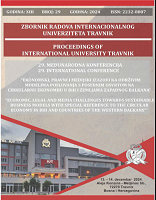DE FACTO I DE IURE NAKNADA NEMATERIJALNE ŠTETE ŽRTVAMA NASILJA U BIH
DE FACTO AND DE IURE COMPENSATION FOR IMMOVABLE DAMAGE TO VICTIMS OF VIOLENCE IN BIH
Author(s): Halid GanijaSubject(s): Gender Studies, Law, Constitution, Jurisprudence, Studies in violence and power, Victimology
Published by: INTERNACIONALNI UNIVERZITET TRAVNIK
Keywords: De facto; de jure; material and immaterial damages; damages compensation; property law request;
Summary/Abstract: Here we will try to clarify the terms ‘’de facto and de jure’’ and how these categories are applied in practice when exercising the rights of victims of violence to compensation for non-material damage in Bosnia and Herzegovina. We will also explain the difference between material and non-material compensation for damage, the rights of victims of violence, as well as the way to exercise this right. Namely, the terms de facto and de jure refer to different legal aspects in realizing the rights of victims of violence to compensation for non-material damages. De facto compensation refers to the actual situation and available opportunities that victims of violence have in practice. De jure compensation refers to legal frameworks and rights that are formally guaranteed by law. Although de jure rights are often clearly defined, but in practice victims of violence face with problems in realizing them due to various de facto obstacles. Compensation for nonmaterial damage to victims of violence represents compensation for suffered mental and physical pain, fear, moral injury, reputation or dignity, as well as for mental suffering caused by trauma. If a person has suffered loss, injury or damage due to a committed criminal act, has the right to compensation for damage, which can be material or non-material. Material damage refers to the loss of property, while non-material damage implies physical pain caused by the commission of a criminal act. A property claim can be submitted by the victim to the prosecutor during the investigation, or to the court during the trial, and it can be submitted verbally or in writing. It is important that the victim declares the amount of property claim.
Journal: ZBORNIK RADOVA INTERNACIONALNOG UNIVERZITETA TRAVNIK
- Issue Year: 13/2024
- Issue No: 29
- Page Range: 430-438
- Page Count: 8
- Language: Bosnian

